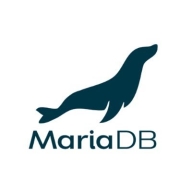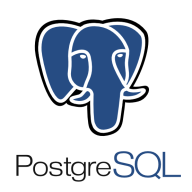


Find out what your peers are saying about Oracle, PostgreSQL, Firebird and others in Open Source Databases.
| Product | Market Share (%) |
|---|---|
| MySQL | 8.8% |
| PostgreSQL | 16.1% |
| MariaDB | 6.7% |
| Other | 68.4% |



| Company Size | Count |
|---|---|
| Small Business | 27 |
| Midsize Enterprise | 12 |
| Large Enterprise | 25 |
| Company Size | Count |
|---|---|
| Small Business | 73 |
| Midsize Enterprise | 31 |
| Large Enterprise | 61 |
| Company Size | Count |
|---|---|
| Small Business | 58 |
| Midsize Enterprise | 26 |
| Large Enterprise | 45 |
MariaDB is an open source relational database created by the original founders of MySQL. It is considered one of the most popular and trusted database servers throughout the world. MariaDB is a valued component found in most cloud offerings and is the default in many Linux tools. It is also widely used by Wikipedia, WordPress, and Google, among other well-known sites. Maria DB easily melds data into concise information from a vast array of applications, such as banking, online shopping, websites, and more.
MariaDB was originally created to improve MySQL performance. It is the most widely chosen database server due to the solution being super fast, robust, user-friendly, and easily scalable. MariaDB also offers a substantial ecosystem of plugins, storage engines, and numerous other valuable tools that make it very attractive for a significant offering of use cases.
The solution’s newest functionalities include compatibility with Oracle Database and Temporal Data Tables, and advanced clustering with Galera Cluster 4, which make it easier for users to research data history from any point in the past. Additionally, the most recent versions include JSON and GIS features. MariaDB is committed to staying an open source solution.
MariaDB Features
Reviews from Real Users
Faustine C., Engineering Supervisor- Corporate Data Solutions and Services at TZ Telecoms Corporation, shares, “The software provides a lot of information on what is happening inside the database. For most performance parameters it is easy to know if something is not right in the configuration or optimization which helps engineers take remedial fine-tuning measures. For example, if the database is underperforming it is easy to know which performance parameter can be adjusted to handle the workload. It is difficult to troubleshoot database issues if many performance parameters can not be monitored or debugged which is the case with some database management systems. It provides great monitoring of data storage, processing, and performance stability which is really important for real-time data storage and processing. It's a user-friendly product.”
A PeerSpot user who is a Senior Engineer at a tech services company relates, “ The solution's high availability is its most valuable aspect. We have found the product to be stable and the initial setup is pretty simple. I'd rate the solution at a ten out of ten. I'm very happy with it overall. I would recommend the solution to others. It's easy to find details about the product online and to learn about it.”
MySQL is an open-source database known for its ease of use and high performance. It offers features like replication and clustering, making it ideal for diverse applications. Its cost-effectiveness and LAMP integration are key advantages for businesses.
MySQL supports a variety of languages and platforms, providing reliable, scalable data management. Its graphical interface and LAMP architecture integration enhance its usability, while community support further strengthens its appeal. Challenges include scalability issues with large databases, lack of advanced clustering, and limited high-availability features. Complex queries may affect performance, and integration can pose difficulties. The outdated interface and insufficient documentation are also concerns, along with replication and backup reliability issues.
What are MySQL's key features?MySQL is widely implemented in industries such as web development, e-commerce, and finance. It's used for managing dynamic websites, powering e-commerce platforms, and supporting financial applications. Its compatibility with PHP and cost-effectiveness make it suitable for CMS platforms like WordPress. With cloud services integration, MySQL is a backend choice for scalable applications in various sectors.
PostgreSQL is a versatile and reliable database management system commonly used for web development, data analysis, and building scalable databases.
It offers advanced features like indexing, replication, and transaction management. Users appreciate its flexibility, performance, and ability to handle large amounts of data efficiently. Its robustness, scalability, and support for complex queries make it highly valuable.
Additionally, PostgreSQL's extensibility, flexibility, community support, and frequent updates contribute to its ongoing improvement and stability.